The laws and regulations of chicken and poultry keeping.
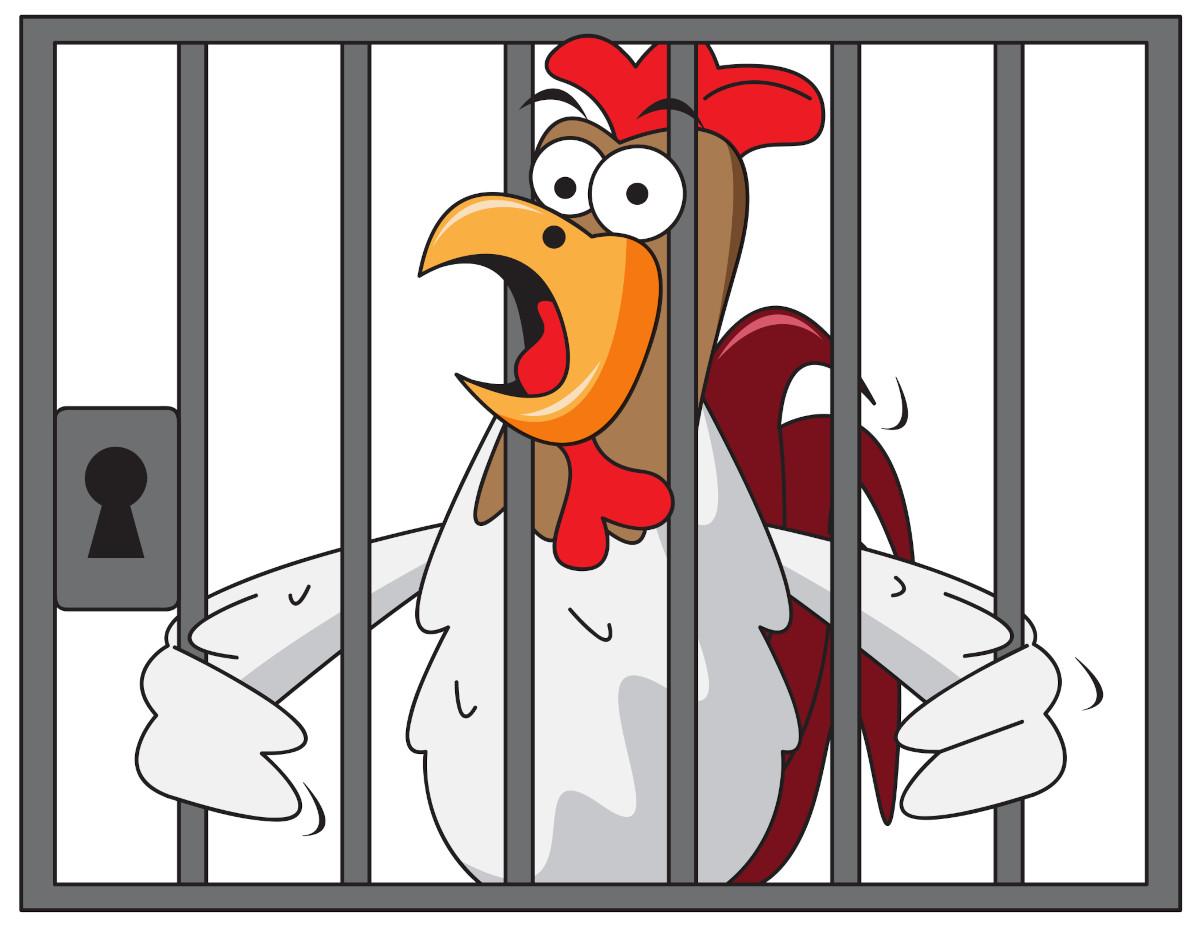
This article contains public sector information licensed under the Open Government Licence v3.0.
With laws getting tighter over the years and the common misconception among poultry keepers that their backyard chickens are not considered livestock but pets, it is likely most keepers are breaking the law in some way.
Below: The interim results from our survey bear this out.
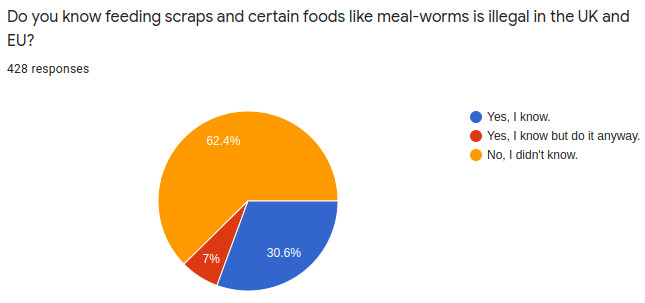
62.4% of people were unaware of a change in the law and 7% who did know about it just ignored it.
Table of Contents
- What are the laws about keeping chickens?
- What are the legal minimum requirements for chickens?
- Legal requirements for selling your eggs:
- Feeding chickens and poultry:
- Care and handling of chickens and other poultry:
- Pest and vermin control:
- The Wildlife and Countryside Act (1981):
- The Animal Health Act (1981):
- Fallen stock and dealing with dead chickens and poultry:
- The Allotments Act of 1950:
- FAQ:
What are the laws about keeping chickens?
There are 9 Acts of Parliament, orders or regulations that directly cover the keeping of chickens and other poultry. These laws control how poultry and chickens are kept, looked after and what they are fed in the UK.
The Acts of parliament and laws which govern how chickens and other poultry are kept:
- Animal Welfare Act 2006,
- The Welfare of Farmed Animals Regulations 2007,
- The Welfare of Animals Order 2006,
- Animal Health Act 1981,
- Prevention of Damage by Pests Act 1949,
- The Animal By-Products Regulations 2013,
- Wildlife and Countryside Act 1981,
- Allotments Act (1950),
- Guidance on fallen stock and safe disposal of dead animals.
A common misconception amongst backyard keepers is that the law doesn't apply to them as they only have few chickens as pets.
All chickens and poultry in the United Kingdom are considered to be livestock and subject to the law, even if you only have three as pets in your back garden.
Below: Here is how chickens and poultry are covered by law:
Unless the context otherwise requires, “poultry” means birds of the following species: domestic fowls, turkeys, geese, ducks, guinea-fowls, pigeons, pheasants and partridges.
The welfare of farmed animals act defines “Laying hen” as a hen of the species Gallus gallus which has reached laying maturity and is kept for the production of eggs not intended for hatching.
The welfare of animals in transport covers all vertebrate animals and cold-blooded invertebrate animals.
And the animal welfare act applies to all vertebrates other than man.
Below: Animal welfare also means not using toxic substances to paint chickens coops with. Here is an email I received just recently with my response below.
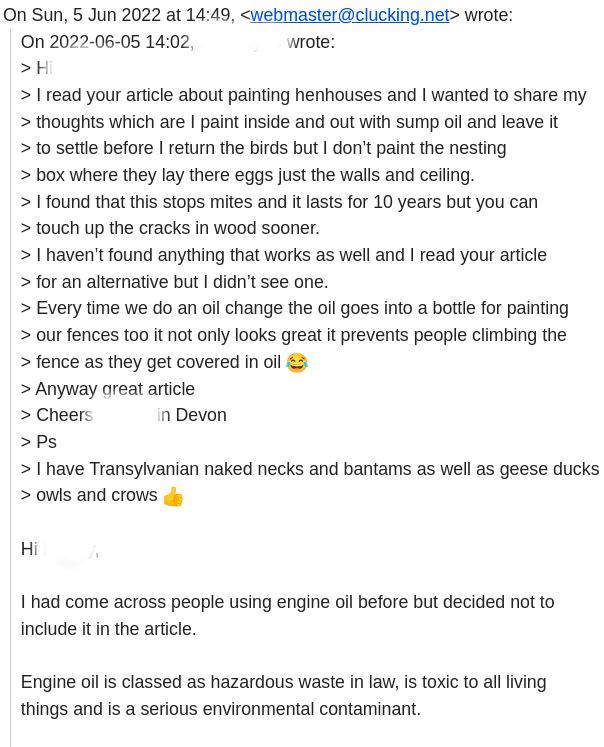
The big difference in the size limits set by DEFRA regarding keeping poultry refers only to the record keeping involved and not the extent to which the law covers the operation.
There are three tiers of chicken keepers in the UK:
- Less than 50 birds,
- Between 50 and 350 birds
- Over 350 birds.
The law has changed and all keepers of any domestic poultry must register with DEFRA and keep records.
Breaking the laws could see animals seized and destroyed and fines levied with custodial sentences for repeat or distressing cases.
What are the legal minimum requirements for chickens?
The Welfare of Farmed Animals Regulations 2007 set out minimum standards under which all farm animals, including poultry and chickens kept for domestic purposes, must be kept.
Legally you must provide your chickens with:
- Linear feeders providing at least 10 cm per bird or circular feeders providing at least 4 cm per bird.
- Continuous drinking troughs providing 2.5 cm per hen or circular drinking troughs providing 1 cm per hen.
- At least 1 nest for each 7 hens.
- Adequate perches, without sharp edges and providing at least 15 cm per hen. Perches must be 30 cm apart and 20 cm away from walls and not positioned over litter.
- A minimum headroom of 45 cm.
- Pop holes must be at least 35 cm high and 40 cm wide.
- Feed and water must be evenly distributed so all birds have access.
- A littered area so that scratching and pecking are possible.
- All hens must be inspected by the owner or the person responsible for the hens at least once a day.
- Light levels must be sufficient to allow all hens to see one another and be seen clearly, to investigate their surroundings visually and to show normal levels of activity.
- Confined chickens must have at least 750 cm² of cage area per hen.
- Hens must be housed in a suitable structure.
- Poultry must be protected from predators.
- Fencing of livestock is the responsibility of the stock owner.
- You must handle chickens in the correct manner.
I have written before about the 5 freedoms for chickens. They apply to all types of poultry and in all countries of the UK.
Below: Perches need to be safe, at least 30 cm apart and provide at least 15 cm of space per chicken.
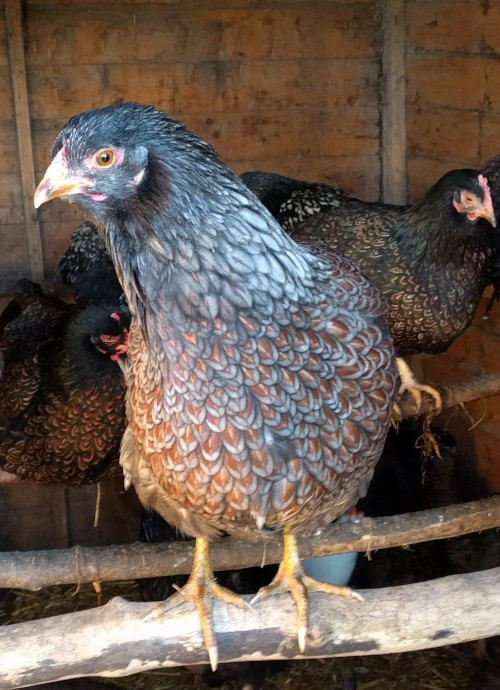
I have gone for the natural look and used branches.
Legal requirements for selling your eggs:
We have some of the strictest laws regarding the sale of eggs.
If you have less than 50 hens you can sell eggs from the end of your driveway.
You are not allowed to class these eggs in any way or to wash them. You can not label them as small, medium or large or call them organic or free range. These are industry standards and there are strict requirements you must comply with in order to use such terms.
Eggs can not be sold to restaurants, shops or for resale.
You must date your eggs.
You must not sell cracked eggs.
Below: Eggs can not be sold by size or as free range or Organic.
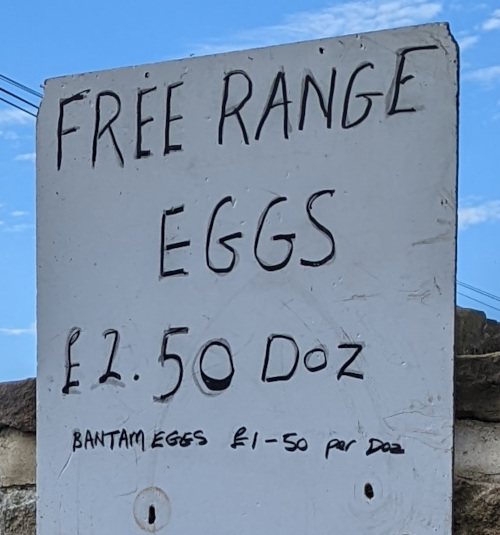
You must use plain egg boxes and remove any existing labels.
The box must have your name and address as well as storage information and use by dates.
If you sell your eggs it is a legal requirement to keep a record of all medicines administered to food producing animals, whether prescribed by your veterinary surgeon or ready mixed in feed and to adhere to egg withdrawal times.
These records must be retained for at least 5 years.
Feeding chickens and poultry:
The feeding of livestock regulation apply to "any animal kept to produce or fattened for food" and "any farm animal species kept as pets".
The animal by products regulations mean that your chickens are only allowed feed that is free from all animals products.
You must not feed your chickens or any poultry:
- Any catering or kitchen waste from your own or a commercial kitchen.
- Raw or cooked meat, fish or shellfish.
- Any unprocessed egg or milk or products containing them.
- Any unprocessed products of animal origin including gelatin and collagen.
- Unwanted food products meant for humans.
- Anything that is mouldy, decomposing or toxic.
There is an exception for Vegan households where there is never any meat or animal products.
Below: It may seem like a waste but chickens must have chicken food.

The reality is if your table and kitchen is producing a lot of waste you probably need to look at how you manage your kitchen.
Care and handling of chickens and other poultry:
The animal welfare act protects all vertebrates excluding humans.
As far as chickens and poultry are concerned the Animal Welfare Act means you must:
- Handle them correctly and not carry birds by their legs or upside down.
- Kick, strike or injure an animal.
- Allow them to fight or organise fighting.
- Cause or allow unnecessary suffering.
- Mutilate, pinion or caponise poultry.
- Transport them in a safe and secure manner.
- Sell or give animals to those under 16 years of age.
- Use restrictive devices like anti crow collars or tie the wings.
- Allow them to indulge in natural behaviours.
- Not withhold veterinary treatment.
Below: An example of cruelty from Facebook with personally identifiable information removed.
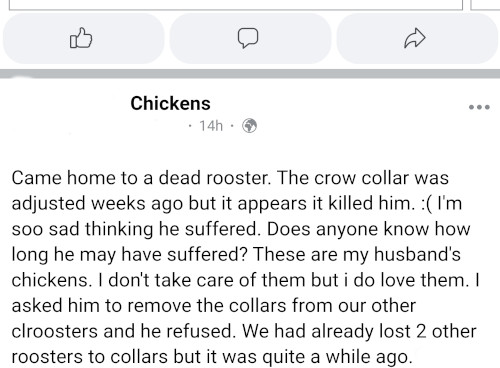
Pest and vermin control:
All poultry keepers are required to keep control of vermin.
The Prevention of Damage by Pests Act requires you to notify your local council of any infestation of pests and to make efforts to control pests on your property at all times.
This act includes rats, mice and insects like mites that infest chickens and their coops as well as any vertebrate or invertebrate that can infest their feed or bedding.
Below: Releasing vermin like rats, mice and grey squirrels is illegal and makes the problem someone else's.
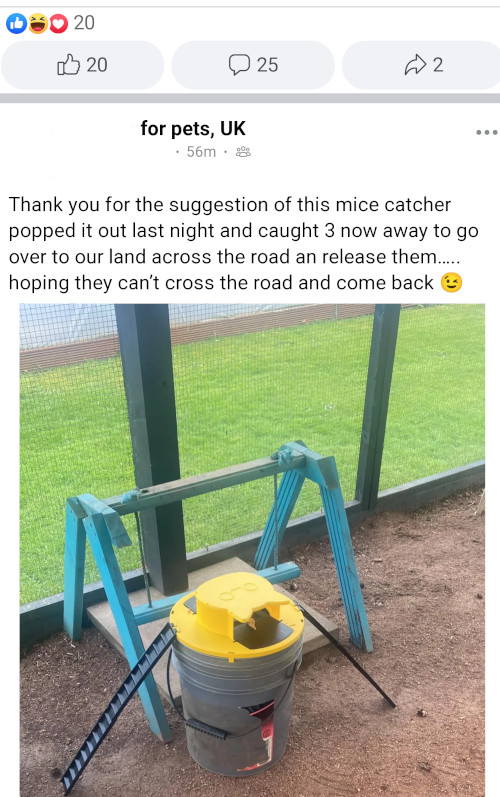
The Wildlife and Countryside Act (1981):
This piece of legislation makes it illegal to release any animal into the wild in the UK which is not ordinarily resident or a seasonal visitor.
You are committing an offence if you release or allow to escape any poultry that you would not normally find in the wild, this includes, chickens, ducks, guinea fowl, turkeys and geese as well as some types of pheasants, partridges and pigeons.
To comply you must make reasonable efforts to keep the birds confined or prevent them escaping.
This seems to have become a huge problem recently and almost everywhere I have been recently I have seen escaped or dumped poultry.
Below: Five domestic geese on the river Aire in Yorkshire that have either been dumped or escaped.
I have also found a flock of guinea fowl at Stocks reservoir and a great many escaped or dumped ducks a places I go walking.
Poultry is often dumped because:
- They are unwanted males,
- The keepers either can't or won't implement bird flu measures,
- They can no longer look after them,
The Animal Health Act (1981):
For backyard poultry keepers this act gives the authorities the power to prevent the spread of disease, slaughter infected animals and sets the levels of compensation provided.
Below: Coops like this are not big enough to keep chickens in.
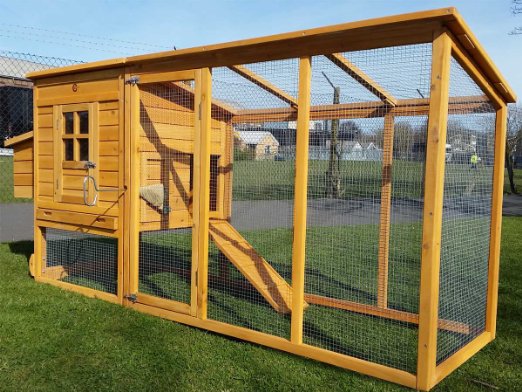
When it comes to coop and run size coops without the extended runs are lacking the 45 cm headroom requirements.
Preventing the spread of disease can be by vaccination, movement control, compulsory slaughter or bio-security measures.
It also confers on the keeper of livestock the responsibility to know which diseases are notifiable and to report suspected cases to the authorities.
Fallen stock and dealing with dead chickens and poultry:
Any Dead chicken or domestic fowl that has died of natural causes or been killed on the premises must be dealt with properly.
After a chicken has died you must arrange for the body to be properly disposed of. Family pets may be buried but livestock need to be disposed of through a registered knacker man or vets.
The Allotments Act of 1950:
The allotments act of 1950 remove all restrictions on the keeping of hens and rabbits on allotments and allows for whatever building are necessary for their care.
Any livestock on allotments must be kept in a manner that does not cause harm or nuisance to others.
FAQ:
Are you allowed to keep chickens in a garden?
You are allowed to keep chickens in your garden. There may be limits to the number of birds you can have and size limitations and any chicken coop over 6 foot 6 ( 2 metres) is likely to need planning permission. There may be local laws and covenants that prevent the keeping of livestock.
Can I stop my neighbour having chickens?
You can not stop your neighbour from keeping chickens. You can report them if they damage your property or make too much noise.
How far should chickens be from the house?
In the UK there is no laws about how near or far chickens need to be from houses.
Can council tenants keep chickens?
If your home is owned or managed by a housing association or local council there may be a clause in your tenancy agreement to stop tenants from keeping chickens or livestock at their property.
Can you let chickens roam free or free range in the UK?
You can let your chickens free range but you are responsible for any damage they do to someone else's property.
